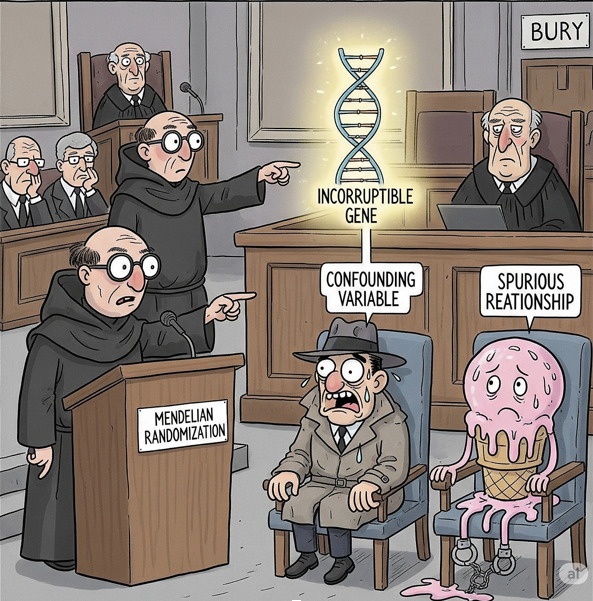The Anxious Analyst's Guide to Why the Numbers Are Lying to You (And Probably Laughing About It)
How to solve a statistical doozy when you're caught betwixt a lying number and an honest gene.
MENDELIAN RANDOMIZATIONCORRELATION VS CAUSATION
Mark Stens Land
8/19/20254 min read


(Image: Courtesy of Gemini )
I'm willing to bet a lot of folks aren't sifting through a stack of various research papers and criticizing their methodologies. Ain’t nobody got time for all that. Most people just defer to someone they trust. I get it–-you read “The 4-Hour Work Week."
So, we’ve established a baseline of pure, unadulterated panic. We know the numbers are lying. We’ve seen the data, and it’s a shifty, unreliable narrator. Sometimes it wants to hint at telling us that ice cream is a murderer and firefighters are arsonists. Cherry-picking data and narrating associations, deceptively trying to imply causation– ain't right. It’s a world where every correlation is a potential conspiracy, and a lurking confounder waits behind every percentage point, ready to undermine our frail grasp on reality. And frankly, this knowledge is paralyzing. I mean, how am I supposed to function? I’m looking at a bowl of kale chips, and I’m thinking, what’s your angle? What are you not telling me? I’m suspicious of my own salad. It’s exhausting. The whole scientific method seems like a cruel joke designed by a hostile universe to make us feel smart right before it pulls the rug out from under us. It’s like buying a beautiful new suit, only to realize at the last minute it’s made of bees.
But wait. Just when you’re ready to abandon all reason and consult a crystal ball for your nutritional advice, the scientists—bless their anxious, over-caffeinated hearts—ride in with a solution. They come bearing a term so magnificently nerdy it has to be important: Mendelian Randomization.
It sounds like a magic trick performed by a monk who was really into pea plants, which, honestly, is not far off. And when they explain it, you can’t help but be impressed. It’s a randomized controlled trial designed by… conception. By the universe itself! It’s brilliant! Instead of wrangling a thousand cranky human subjects and telling half of them they can’t have bacon for a decade, you just look at their genes. See, nature, in its infinite and slightly chaotic wisdom, runs its own experiment when we’re born. It hands out genetic variants—tiny little tweaks in your DNA—completely at random. You might get the gene that makes you metabolize coffee like a hummingbird, and your neighbor gets the gene that makes one sip give him the shakes. It’s a genetic lottery.
And this, this is where the magic happens. These genetic variants are the ultimate spies. They’re called “instrumental variables,” which is a fancy way of saying they’re a perfect proxy for a behavior. And since you’re stuck with them from birth, they solve our two biggest headaches. First, they kick the confounders out of the statistical nightclub. Remember how smoking was the shady character hanging out with coffee, making coffee look bad? Well, your genes don't care if you smoke. They were assigned at birth, long before you thought your first cigarette looked cool. They’re incorruptible. Second, they solve reverse causation. You can’t blame your hat for your baldness, and your heart disease can’t change the genes you were born with. It’s a one-way street!
“So do we have a way to prove it wasn’t the coffee? That my beautiful, dark, life-affirming coffee was an innocent bystander? I want to write my Keurig an apology note. I’ve been so cold to it this week,” I ask myself.
Of course, it can’t be that simple. Nothing that promises to soothe my specific brand of existential dread ever is. As soon as you start to relax, you read the fine print, the list of assumptions that will haunt your dreams.
First, the gene has to be strongly associated with the thing you’re studying. And this just sends me into a spiral. What counts as strong? Is it a marriage? A deep, meaningful bond? Or is it just a casual acquaintance? What if the gene and the exposure just see each other at parties? "Oh, hey, yeah, LDL Cholesterol, I know that guy. We’re not close." The whole thing could be built on a flimsy social contract!
Second, the gene absolutely cannot be associated with any of the confounders. It can’t be a double agent. You want me to believe that my DNA—this twisted ladder of inherited anxieties and a predisposition for sighing—isn’t secretly colluding with my other bad habits? That seems wildly optimistic.
And third, the gene can only influence the health outcome through the one thing you’re studying. It has to be monogamous. It can’t have any side hustles. This is called “no pleiotropy,” which sounds like a political philosophy I’d be against. You’re telling me this tiny piece of code has only one job? In this economy? The whole thing is a fantasy! It’s the romantic comedy of statistical analysis, and I’m not buying it!
But then they show you the examples, and you start to believe again. They can use a gene that makes people naturally drink less alcohol to see if drinking causes heart disease, without worrying that the people who drink less also happen to jog more. They have a gene for that! A cheap date gene! “I don’t have a drinking problem, fool. I’m just genetically predisposed to confounding variables,” I tell my friends. They use genes associated with a higher BMI to see if that extra weight directly causes diabetes, cleanly slicing away all the other lifestyle factors like a master chef. It’s… it’s beautiful.
So, in the end, Mendelian Randomization is this elegant, almost perfect tool for cutting through the statistical noise. It’s the closest we can get to a crystal-clear answer. But am I soothed? Is my anxiety gone? Of course not. Because now I’ve just transferred my paranoia. We’ve found a way to trust the numbers, but can we trust the genes? Can we trust the geneticists? They’re so precise… it’s frightening. We’ve solved the problem of the lying numbers, only to discover they were just henchmen. And the real mastermind… has been inside us all along.
(What are your thoughts about all of this? Ask me about how and why my pizza's are nourishing. Tell me what you're working on --if it's food related. Hit me up on Instagram @A Taco is A Pizza, and let's make something together!)
New Mexican Pizza, LLC | ©2021-2026. All rights reserved.
My post content


